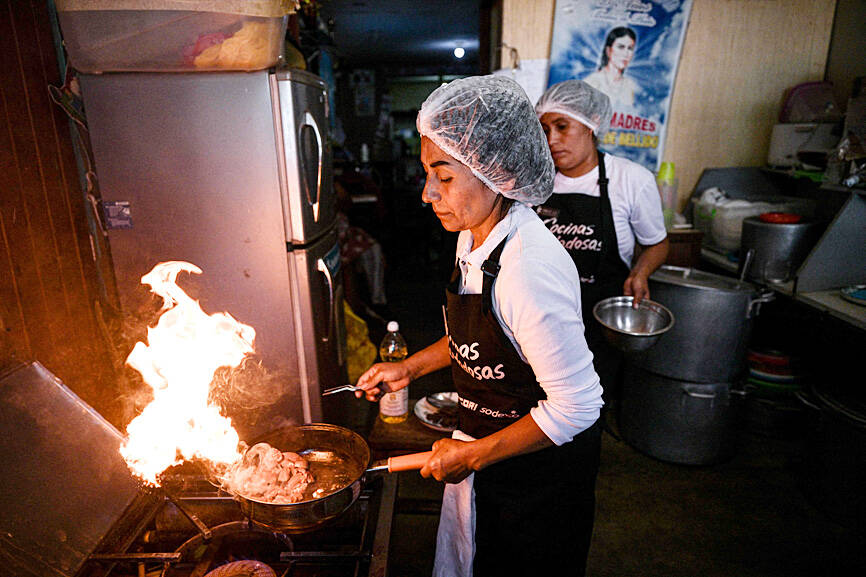Peruvian cook Isabel Santos prepares a salad with carrot peels and pea shells at a community kitchen in Lima; a disciple of a sustainable cuisine movement seeking to tackle hunger and food waste at the same time.
With five other women, she works at making 150 tasty, vitamin-packed servings that include “the peels of potatoes, peas, carrots, leeks and ginger that we used to throw away,” the 76-year-old said.
Santos is a follower of the “Optimum Kitchen” concept of Peruvian chef Palmiro Ocampo, who promotes the concept of nose-to-tail cooking — part of a more planet-friendly food drive increasingly finding a following worldwide.

Photo: AFP
“There is no such thing as waste,” Ocampo, 40, said on a recent visit to Santos’ Maria Parado de Bellido kitchen in a poor district of southern Lima.
“An ingredient has to be used in its entirety,” he said, in a world where a third of food is wasted while 800 million people go hungry.
Ocampo and his wife, Anyell San Miguel, train cooks from Peruvian soup and community kitchens and share recipes through their project Ccori, which means gold in the indigenous Quechua language and was created 11 years ago to promote “culinary recycling.”
As a result “more than a tonne of ingredients that would normally end up in the garbage have been ... turned into delicious food,” the chef said.
“Many of these [formerly discarded] food parts have more nutrients” — vital to combat anemia, which affects more than two in five children in Peru, he said.
Banana peels, for example, “contain a lot of magnesium and zinc” and pea shells are rich in iron, he said.
At first, it was not easy to convince people, said Ocampo, who describes himself as a “professional recycler.”
People told him that “it is one thing not to have any money, but we’re not going to eat garbage,” he said.
The concept seems to have taken root.
The salad “seems delicious and nutritious to me,” 75-year-old motorcycle taxi driver Demostenes Parinan said at Santos’ kitchen, where a main course, soup and drink is sold for the equivalent of about US$1.30.
Also on offer that day was a puree prepared with broccoli stems, a side of pea shells and rice, and drinks made with lemon and celery peels.
“Pigs used to eat better than us, because they ate all the leftovers that we threw away,” replete with nutrients, Santos said.
Anita Clemente of La Amistad soup kitchen in another part of Lima said Ocampo’s project “has taught us to ... create healthy dishes” with ingredients once discarded.
Clients also end up saving money, because they learn to consume the entirety of every product they buy, she said.
According to the UN Environment Program, humankind wasted the equivalent of a billion meals every day in 2022.
Ocampo’s concept relies on three main elements: food preservation through methods such as fermentation, “culinary recycling” to extract more from an ingredient already used, and cooking with parts previously considered inedible.
Another beneficiary is planet Earth: the more nutrition can be extracted from a single plant or animal, the fewer need to be grown, while also reducing the greenhouse gases released from the decomposition of organic waste.

Swedish campaigner Greta Thunberg was deported from Israel yesterday, the Israeli Ministry of Foreign Affairs said, the day after the Israeli navy prevented her and a group of fellow pro-Palestinian activists from sailing to Gaza. Thunberg, 22, was put on a flight to France, the ministry said, adding that she would travel on to Sweden from there. Three other people who had been aboard the charity vessel also agreed to immediate repatriation. Eight other crew members are contesting their deportation order, Israeli rights group Adalah, which advised them, said in a statement. They are being held at a detention center ahead of a

A Chinese scientist was arrested while arriving in the US at Detroit airport, the second case in days involving the alleged smuggling of biological material, authorities said on Monday. The scientist is accused of shipping biological material months ago to staff at a laboratory at the University of Michigan. The FBI, in a court filing, described it as material related to certain worms and requires a government permit. “The guidelines for importing biological materials into the US for research purposes are stringent, but clear, and actions like this undermine the legitimate work of other visiting scholars,” said John Nowak, who leads field

Former Nicaraguan president Violeta Chamorro, who brought peace to Nicaragua after years of war and was the first woman elected president in the Americas, died on Saturday at the age of 95, her family said. Chamorro, who ruled the poor Central American country from 1990 to 1997, “died in peace, surrounded by the affection and love of her children,” said a statement issued by her four children. As president, Chamorro ended a civil war that had raged for much of the 1980s as US-backed rebels known as the “Contras” fought the leftist Sandinista government. That conflict made Nicaragua one of

NUCLEAR WARNING: Elites are carelessly fomenting fear and tensions between nuclear powers, perhaps because they have access to shelters, Tulsi Gabbard said After a trip to Hiroshima, US Director of National Intelligence Tulsi Gabbard on Tuesday warned that “warmongers” were pushing the world to the brink of nuclear war. Gabbard did not specify her concerns. Gabbard posted on social media a video of grisly footage from the world’s first nuclear attack and of her staring reflectively at the Hiroshima Peace Memorial. On Aug. 6, 1945, the US obliterated Hiroshima, killing 140,000 people in the explosion and by the end of the year from the uranium bomb’s effects. Three days later, a US plane dropped a plutonium bomb on Nagasaki, leaving abut 74,000 people dead by the